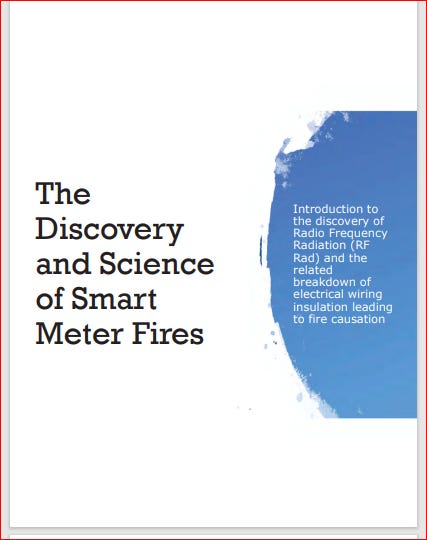Germany Will Only Install SM Transmitters on Homes with High Energy Consumption
The race for "Sustainability" and a "smart grid" is over, at least for now, and the U.S. didn't win.
On my companion news website Patricia’s Substack for Safe Tech International, today I quoted Gary Marcus: The race for "AI Supremacy" is over, at least for now, and the U.S. didn't win.
The U.S. has also lost the race to energy efficiency - because smart meters form one of the backbones of surveillance and economic growth flying under the guise of sustainability - with the choices of planned obsolescence and the unnecessary expense of widescale useless data collection - which increases the demand for the water and energy required to store the useless data.
(In addition to health and safety expertise based on the opinion of mercenary tobacco scientists, which is by definition unsustainable.)
Translated from German, the article below provides an overview of “intelligent metering systems.”
The article explains that not all customers will receive a communication module on their meter. Only those homes with higher consumption will receive a meter that will be transmitting data.
One can guess that Germans may be more sensitized to issues surrounding state abuse of power.
It would also be interesting to compare the engineering of the German metering system with those in the U.S., including the issues of a potential EMP, surge protection and other concerns such as those reported in the expert smart meter fire risk report; The Discovery and Science of Smart Meter Fires - an excellent reference describing individual fires, not infernos. Books sold at Home - Fire Safety Books - Fire Science and Technology Inc.
It would also be interesting to know if the German grid operators address power quality and dirty electricity issues.
(We know that European regulations for ground current are much stricter than in the U.S.)
Germany:
Digital electricity meters: How to benefit from the installation obligation
In contrast to analogue systems, digital electricity meters measure consumption in great detail. They give you a precise insight into the energy consumption of your household appliances and help you save electricity. From 2025, the installation of intelligent metering systems, often referred to as (remote) smart meters, will be mandatory. LichtBlick tells you what you need to consider when installing or switching to digital electricity meters, and what advantages modern electricity meters have.
The article explains that not all customers will receive a communication module on their meter.
Why are digital electricity meters becoming mandatory?
The EU has set itself strict climate targets. By 2050, the whole of Europe is to become climate-neutral and 55 percent of greenhouse gases must be saved by 2030. One of the measures in Germany is the digitization of electricity meters, which creates the best conditions for a conscious use of energy.
This is because many consumers do not even know the power guzzlers in their households. The new electricity meter is intended to change exactly that: It provides detailed information on how much electricity was consumed in which areas of the household. This helps you to identify the strongest consumers and to make small changes in the long term. To save energy. The legal basis for the switch to digital electricity meters is provided by the Metering Point Operation Act (MsbG).
Who gets a digital electricity meter?
In the coming years, every household will be obliged to change its electricity meter. Households with an average consumption of less than 6000 kilowatt hours per year will be required to receive a digital electricity meter without a data connection via a communication module by 2025. The grid operator or electricity provider arranges for the replacement.
Digital electricity meters record electricity consumption in detail
A digital electricity meter measures the consumption in your household and breaks down the data in detail. A display replaces the classic counting disc. The digital meter can neither receive data from the outside nor pass on information to third parties. You still have to read your electricity consumption manually. For classic households with average consumption, these meters are sufficient.
Which households will get a smart meter?
Anyone who has an above-average electricity consumption of 6000 kilowatt hours or more per year will receive a smart meter. Such high electricity consumption arises, for example, if there is an electric car in the household that is charged via a wallbox. Electricity customers who operate a solar system with an output of more than seven kilowatts will also receive the intelligent control system with a communication module. Anyone who operates a controllable night storage heater or a heat pump is still excluded from the smart meter obligation, but can opt for it if they wish.
Can I refuse the installation of a smart metering system?
The installation of digital electricity meters is mandatory. You have no way to take action against it. However, if another metering point operator makes you a cheaper offer, you can switch to it. Attention: In the event of a voluntary change, the metering point operator is no longer bound by the statutory price caps.
SOURCE Digital electricity meters: How to benefit from the installation obligation
PS I am assuming this is from Germany!




